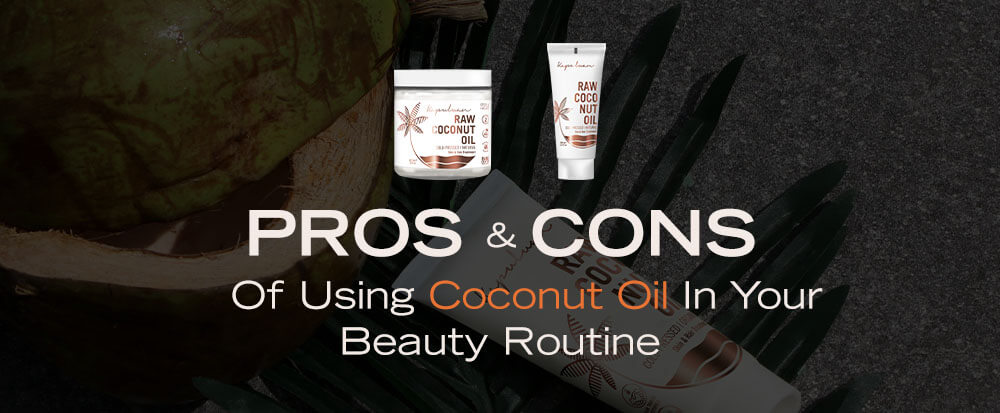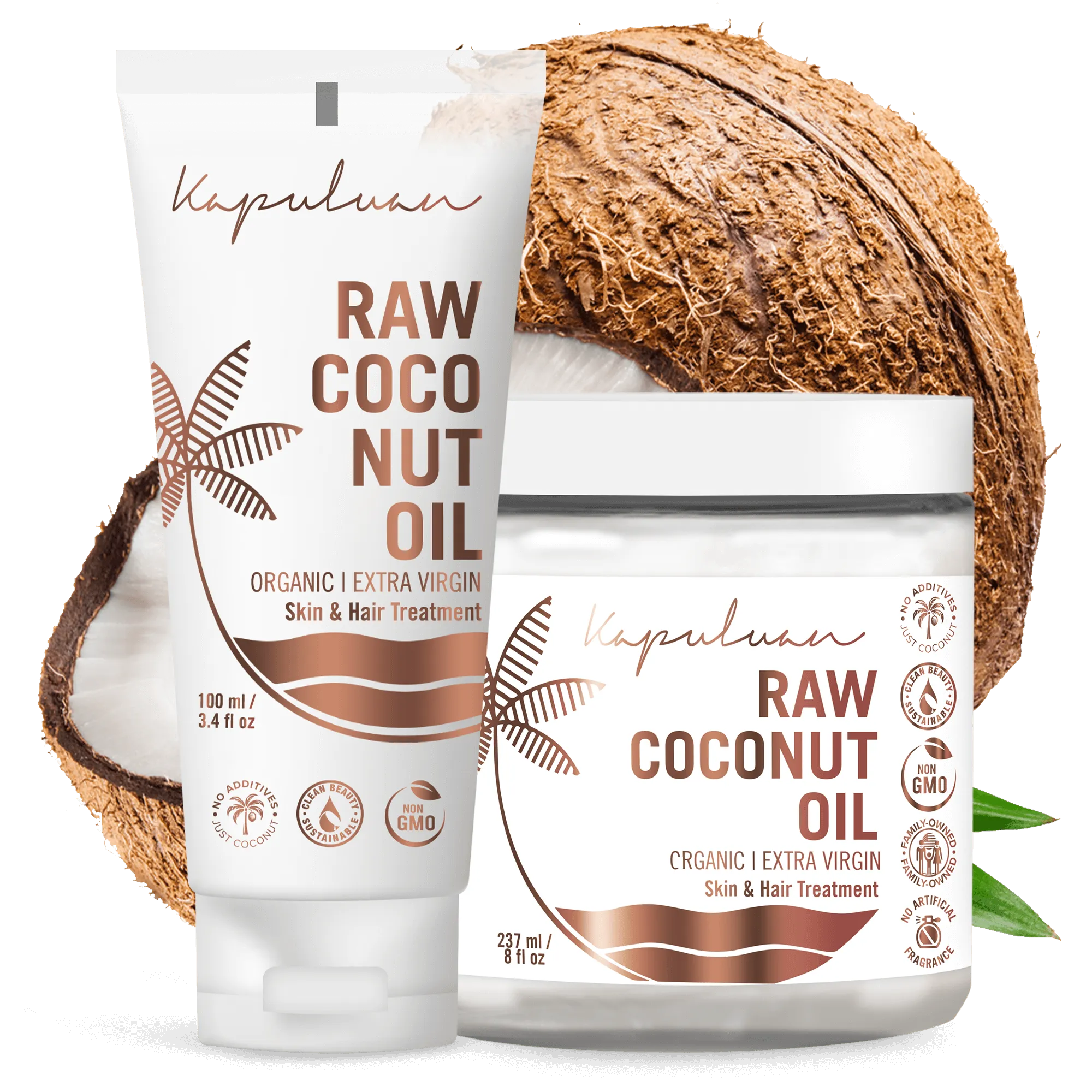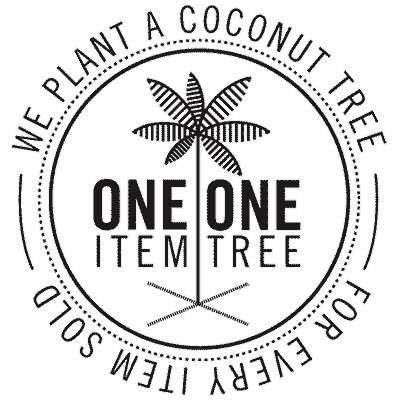We’ve all heard the hype about coconut oil. It’s been touted as a miracle ingredient that can do everything from nourishing our skin to promoting hair growth and even fighting off bacteria. But is it all it’s cracked up to be? As lovers of natural beauty products, we’re always on the hunt for ingredients that not only benefit our complexions but also align with our desire for freedom – freedom from harsh chemicals, synthetic additives, and anything else Mother Nature didn’t intend for us.
However, like any product, coconut oil has controversies and potential downsides. Some people swear by its moisturizing power, while others warn about clogged pores or potential allergic reactions. In this article, we’ll dive deep into the world of
coconut oil in your beauty routine – exploring its pros and cons so you can decide whether to incorporate it into your regimen. Because ultimately, true beauty freedom lies in knowledge and making choices that best suit you!
Key Takeaways
- Coconut oil offers numerous benefits for skincare, such as moisturizing, combating acne-causing bacteria, and promoting wound healing.
- It can benefit haircare, including controlling dandruff, adding shine, and protecting against heat damage.
- Coconut oil contains lauric acid, which has potent antibacterial properties and can improve oral hygiene when used for oil pulling.
- However, individuals with oily or acne-prone skin may need to use coconut oil sparingly or avoid it altogether, as it can worsen acne and intensify oiliness.
Understanding the Nature of Coconut Oil
It’s funny, isn’t it, how coconut oil – this seemingly ordinary kitchen staple – can hold so much potential for your beauty regimen? It all starts with the oil extraction methods. There are two primary ways to extract oil from coconuts: dry processing and wet processing. Dry processing involves drying the coconut meat, or copra, and then pressing it to extract the oil. This method yields a higher fat content, but some argue it results in an inferior taste and less nutritional value. Wet processing, on the other hand, uses fresh coconut meat and milk to produce an emulsion which is then separated into oil and protein. This method retains more of the natural nutrients found in coconuts.
Now let’s delve deeper into those nutritional values that we just mentioned. Coconut oil is rich in saturated fats—specifically medium-chain triglycerides (MCTs). These fats are known for their easy absorption by our bodies, providing quick energy boosts and promoting heart health. Furthermore, coconut oil contains lauric acid—a substance with potent antimicrobial properties—and vitamin E—an antioxidant essential for skin health.
So why should you consider incorporating this tropical treasure into your beauty routine? Aside from its impressive nutritional profile,
coconut oil offers remarkable skin and hair care benefits too! Its hydrating properties make it a fantastic moisturizer, while its antibacterial qualities can help combat acne-causing bacteria. Plus, its ability to penetrate
hair better than most oils due to its low molecular weight is no surprise why many hail it as a hair-care hero! Without belaboring the point any further,
coconut oil carries an impressive array of benefits that could elevate your natural beauty regimen like never before!
Analyzing its Moisturizing Properties
Delving into its moisture-locking capabilities, you’ll find that this tropical treasure can deeply hydrate and nourish your skin like no other. Thanks to various oil extraction methods, coconut oil has a unique molecular structure that allows it to penetrate the skin on a deeper level. Unlike most lotions that merely sit on your skin’s surface, coconut oil seeps into your pores, providing substantial hydration from within. This is why many of us searching for freedom from dry and lifeless skin are increasingly turning towards this natural remedy.
Beyond just moisturizing our skin, there’s also much to be said about the dietary impacts of coconut oil. Consuming it regularly can lead to increased levels of good cholesterol and even weight loss when combined with an active lifestyle. The same fatty acids that give coconut oil its fantastic
moisturizing properties also play a role in boosting metabolism and improving heart health. So not only does this wonder oil keep our outer selves looking fresh and vibrant, but it also contributes positively to our internal health.
Coconut oil’s impressive moisturizing abilities do need careful handling, though. We must remember that while it works wonders for some people’s skin types, for others prone to oily or acne-prone skin, using too much might exacerbate their condition due to its high comedogenic rating, which means it can clog pores if used excessively. And as with any skincare product or regimen, one size doesn’t fit all – so always listen carefully to what your body tells you about how well it responds to different treatments and adjust accordingly!
Evaluating its Role in Hair Growth
Switching gears to assess its impact on hair health, we’re met with compelling evidence that suggests it’s not just our skin that can reap the benefits. Coconut oil has been hailed as a wonder product for promoting healthy hair growth. Packed with lauric acid, coconut oil has a high affinity for hair protein and easily penetrates inside the hair shaft due to its low molecular weight. The result? Stronger strands are less prone to breakage and damage.
Let’s delve into some more specifics by looking at this handy table:
| Benefits of Coconut Oil for Hair |
Explanation |
| Promotes Scalp Health |
Its antimicrobial properties can combat scalp infections, fostering an environment conducive to hair growth. |
| Controls Dandruff |
It moisturizes dry scalp effectively, thereby reducing flakiness and dandruff. |
| Prevents Hair Breakage |
By penetrating the hair shaft, it strengthens from within, resulting in less breakage. |
| Adds Shine |
Regular use leaves your locks glossy and lustrous. |
| Protects Against Heat Damage |
A natural conditioner that shields your mane from heat-styling tools and environmental stressors. |
Remember though – the effects of coconut oil on your tresses won’t be experienced overnight! Patience is key here; consistent application is necessary over weeks or even months before you start noticing tangible changes in your hair quality. So while some inconvenience might be involved (let’s face it, coconut oil can get messy), we believe the potential payoff in terms of improved scalp health and better dandruff control could make incorporating this natural beauty product into your routine worthwhile!
Exploring its Antibacterial Potential
Imagine yourself as a brave knight, battling the fierce dragon of harmful bacteria with the shield of coconut oil’s potent antibacterial properties. This isn’t just fantasy; it’s a real-life drama that unfolds on your skin every day. The lauric acid found in coconut oil has been scientifically proven to kill common strains of bacteria, including those responsible for acne and other skin infections. Thanks to this feature, incorporating coconut oil into your beauty routine could be akin to having your knight in shining armor.
Did you know that these benefits extend even beyond skincare? Let’s talk about the oral health benefits of coconut oil. Called ‘
oil pulling,’ swishing coconut oil in your mouth can significantly improve oral hygiene. This traditional Indian remedy reduces harmful bacteria in the mouth, whitens teeth, and fights bad breath. Furthermore, its antibacterial properties also have wound-healing capabilities, which can be useful when dealing with minor cuts or scrapes.
Coconut oil is not just another beauty product; it’s our natural ally against harmful bacteria lurking on our skin and inside our mouths. It may take time to get used to using an ingredient from your kitchen cabinet as part of your daily
beauty regimen but believe us when we say it’s worth it! With its wide array of benefits from promoting healthier gums and teeth to supporting wound healing and keeping pesky pimples at bay – who wouldn’t want this superhero by their side? So let’s embrace this freedom from artificial products and return to nature by making coconut oil a staple in our self-care routines.
Considering the Risk of Pore-Clogging
However, it’s not all roses and sunshine; there’s a catch to all these wonderful benefits – the risk of pore-clogging. Coconut oil is known for its dense consistency, which can lead to blocked pores if not used properly or too frequently. This can trigger an exacerbation of acne in some people, especially those with naturally oily skin. While coconut oil has numerous advantageous properties for our health and beauty, this aspect of pore-clogging cannot be overlooked when considering it as part of your skincare routine.
- Acne exacerbation: Coconut oil may worsen acne in individuals prone to breakouts due to its high comedogenic rating (meaning it tends to block pores).
- Oiliness management: Those with already oily skin might find that coconut oil intensifies their shine rather than reducing it.
- Allergic reactions: Some individuals could have a sensitivity or allergic reaction to coconut oil, resulting in inflammation or redness.
- Potential dryness: Ironically enough, overuse of any oil, including coconut, can strip away natural oils from your skin, potentially leading to dryness and irritation.
That said, we’re not suggesting you banish this tropical elixir from your regimen entirely! It’s about understanding your unique skin type and how different ingredients might interact with it. For instance, those with dry or mature skin might find that the moisturizing benefits outweigh the risk of clogged pores. In contrast, people struggling with acne may want to use this oil sparingly or avoid it altogether instead of other less comedogenic oils like argan or jojoba oil. While we champion the freedom to experiment and discover what works best for you individually, remember that balance is key when incorporating
products like coconut oil into your beauty routine!
Potential Allergic Reactions
While it’s rare, some folks might find themselves reaching for a box of tissues rather than admiring their glowing skin after applying this tropical treat. Coconut oil is generally considered safe for topical use, but like any other skincare product, there can be instances where it triggers allergic reactions. It’s important to remember that not everyone has the same skin type or reacts similarly to certain products – what may work wonders for some could potentially cause discomfort for others.
| Allergy Symptom |
Description |
Reaction Prevention |
| Skin Rash |
Redness and itchiness on the area where the coconut oil was applied. |
Do a patch test before using coconut oil extensively on your skin. |
| Swelling |
Unusual swelling in parts of the face or body after application. |
Look for early signs and stop usage immediately if you observe any abnormalities. |
| Troubled Breathing |
Difficulty in breathing shortly after application. This is a severe reaction and requires immediate medical attention. |
Always start with small amounts when introducing new products into your beauty routine. |
Just as we love basking in our freedom, we also need to be conscientious about how our bodies react to what we feed them – both externally and internally. So, while incorporating natural products like coconut oil into your beauty regime can offer
numerous benefits, it’s equally crucial to closely monitor how your skin responds to these changes. Remember that feeling beautiful shouldn’t come at the cost of discomfort or health risks – so take it slow with new regimes and always prioritize ‘Reaction Prevention’ over instant results!
Ways to Incorporate it into Skincare and Haircare Regimen
Ready to elevate your skincare and haircare game? Let’s delve into some transformative ways to integrate this tropical wonder into your daily regimen, ensuring you reap all its benefits. Coconut oil is a versatile addition to any beauty routine because of its multi-use properties. You can use it as a deep-conditioning hair mask for shiny, luscious locks or as a natural makeup remover that’s gentle on the skin yet potent enough to take off stubborn mascara. As part of your skincare, coconut oil works wonders in hydrating dry patches and soothing irritations.
Now, let’s talk about those oil-pulling benefits. If you’re looking for ways to maintain oral health naturally, we suggest trying coconut oil pulling! This traditional Indian practice involves swishing coconut oil around your mouth for about 15-20 minutes daily before brushing your teeth. It helps reduce harmful bacteria in the mouth, freshen breath, and even whiten teeth over time!
Don’t miss out on lip care uses, either! Chapped lips are never fun but worry not – you’ve got a little jar of magic!
Coconut oil is an excellent lip balm due to its moisturizing and healing properties. Apply it directly onto lips before bed or throughout the day when needed for soft and supple lips that feel as good as they look. Remember: integrating coconut oil into your beauty routine is an affordable way to indulge yourself while embracing nature’s best offerings, so go ahead – liberate yourself from conventional products and enjoy the tropical goodness of coconuts!
The Verdict: Is it Worth the Hype?
In the grand scheme of things, this natural elixir has been making waves in the beauty world, and it’s no wonder why. It’s like having a mini spa in your own home, pampering you from head to toe with its versatile benefits; indeed, it’s worth every drop of hype. From our personal experience and numerous consumer experiences, coconut oil has proven to be a game-changer in skincare and haircare routines. We’ve seen how it deeply nourishes skin, fights against aging signs, promotes heart health, and serves as an exceptional conditioner that leaves hair silky smooth.
The hype validation around coconut oil isn’t solely based on marketing ploys or fleeting trends. Instead, its benefits are backed by scientific research and centuries-old wisdom passed down through generations globally. The lauric acid present in coconut oil possesses potent antimicrobial properties that help combat acne-causing bacteria – a testament we can personally vouch for! Further, its high penetration levels efficiently condition our hair from within rather than just coating the surface.
We’d be remiss not to mention some concerns about using coconut oil. While generally safe for most people, some may find themselves allergic or sensitive to it, causing skin irritations – always perform patch tests before incorporating any new product into your routine! Moreover, being comedogenic (pore-clogging) by nature, individuals with oily skin might want to use this sparingly or avoid it altogether if prone to breakouts. But on balance? We believe the pros outweigh the potential cons when used wisely, making this tropical marvel a worthy addition to your beauty regimen!




